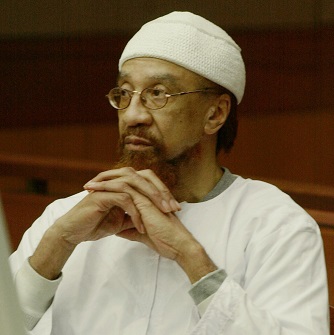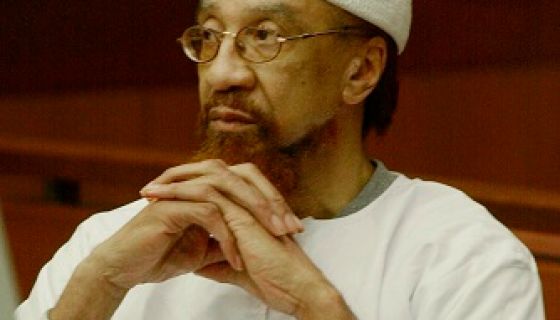
(AP Photo)
ATLANTA (AP) — A 1960s black militant-turned-Muslim cleric is challenging his imprisonment for the killing of a sheriff’s deputy in 2000, saying his constitutional rights were violated at trial.
Jamil Abdullah Al-Amin, 75, gained prominence in the 1960s as a Black Panthers leader who went by H. Rap Brown and famously said, “Violence is as American as cherry pie.” He later converted to Islam, changed his name and was living in Atlanta when authorities say he shot two sheriff’s deputies, killing one of them.
In 2002, Al-Amin was convicted of murder in the shooting death of Fulton County sheriff’s Deputy Ricky Kinchen and the wounding of Kinchen’s partner, Deputy Aldranon English. He was sentenced to life in prison.
The 11th U.S. Circuit Court of Appeals plans to hear arguments Friday in a constitutional challenge to his imprisonment.
Al-Amin argues his right to not testify in his defense was violated when a prosecutor raised direct questions for him during closing arguments in a sort of mock cross-examination. Al-Amin also says the trial judge should have let his lawyers question an FBI agent who was at his arrest about another incident involving the agent.
During his days as a radical activist in the 1960s, Al-Amin served as a leader in the Student Nonviolent Coordinating Committee. He called violence a necessary tool for blacks and once suggested he might shoot Lady Bird Johnson, the widow of former President Lyndon B. Johnson.
While serving a five-year sentence for his role in a robbery that ended in a shootout with New York police, he converted to the Dar-ul Islam movement and changed his name.
He moved to Atlanta in the 1970s and became the leader of one of the nation’s largest black Muslim groups, the National Ummah.
On March 16, 2000, Kinchen and English went to Atlanta’s West End neighborhood, where Al-Amin lived, served as an imam and owned a grocery store, to serve a warrant for failure to appear in court on charges that he was driving a stolen car and impersonated a police officer during a traffic stop the previous year.
English testified at trial that Al-Amin raised a high-powered assault rifle and fired when the deputies tried to arrest him. Then, prosecutors said, he used a handgun to fire three shots into Kinchen’s groin as the wounded officer lay in the street.
He was arrested four days later in White Hall, Alabama, a small town where he had helped develop a Muslim community.
Prosecutors portrayed Al-Amin as a deliberate killer, while his lawyers painted him as a peaceful community and religious leader who had helped clean up poverty-stricken areas. They suggested he was framed as part of a government conspiracy that had followed him from his militant days.
Character witnesses during the sentencing portion of his trial included former Atlanta mayor and U.N. ambassador and civil rights leader Andrew Young, who had met Al-Amin in the 1980s.
“He was — and is — a very peaceful man,” Young said. “I saw no trace of any of the reported anger.”
Prosecutors sought the death penalty, but jurors decided on a sentence of life in prison without the possibility of parole.
During closing arguments, the prosecutor displayed a chart titled “Questions for the defendant” and asked “pointed questions” meant to focus the jury’s attention on the fact that Al-Amin didn’t testify, his lawyers argue.
Al-Amin also had court permission to remain seated during the trial for religious reasons, including not standing when the jury entered. The prosecutor implored the jury, “Don’t stand for him.”
The defense objected to these actions by the prosecutor, and the trial judge gave the jury instructions meant to lessen any harm caused by the prosecutor’s statements.
In September 2017, U.S. District Court Judge Amy Totenberg found that Al-Amin’s constitutional right not to testify was violated by the prosecutor’s questioning. She also found that the trial court’s attempt to mitigate the prosecutor’s violation was insufficient and may have actually been harmful.
But “there is ‘weighty’ evidence supporting his conviction,” she wrote.
Lawyers for Al-Amin have argued there was strong evidence of his innocence at the scene of the shooting. Totenberg conceded that the crime scene evidence presents a “mishmash of inconsistencies,” but she said evidence recovered near the scene of his arrest in Alabama “strongly ties” him to the crime.
Totenberg concluded the trial court also violated Al-Amin’s rights by refusing to let his lawyers cross-examine an FBI agent involved in his arrest about an earlier incident in which the agent was accused of shooting an unarmed Muslim man in Philadelphia and putting a gun with no fingerprints on it next to the man’s body. The guns used to shoot the Georgia deputies that were found near Al-Amin in Alabama also had no prints on them, and his lawyers contended that the FBI agent planted them.
The trial court excluded that evidence because the agent had been investigated in the Philadelphia incident and cleared of wrongdoing. Totenberg said the trial court was within its right to make that decision.
Overall, Totenberg found that there was not “sufficient cumulative error” to find his sentence unconstitutional. While the violation of his right not to testify was “serious and repeated,” Totenberg said she was constrained by the “onerous standards” imposed by the law and Supreme Court case law.
Al-Amin’s lawyers are asking the 11th Circuit to reverse Totenberg’s ruling.

















